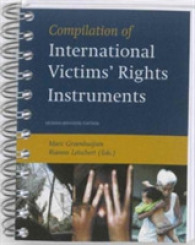- ホーム
- > 洋書
- > 英文書
- > History / World
Full Description
This book explores the ways in which non-government organisations have contributed to the reconstruction of, and care for populations in, Western European countries including but not limited to Belgium, France, Germany, Italy and the United Kingdom in the aftermath of the World Wars.
Historical research on voluntary or non-government organisations and their contribution to the reconstruction of states, communities and humanitarian assistance to civilian populations following conflicts, epidemics and disasters through the twentieth century has generally focused on non-Western European countries, except for Second World War II. The historiography suggests that it is mostly in Eastern Europe, the Middle East, Asia and Africa that natural or man-made disasters have occurred and that these places have been the focus for humanitarian assistance. Rather, the humanitarian enterprise is viewed through the binary of the Global North/Global South, those who save and those who are saved. The chapters in this volume investigate how the Red Cross movement - the League of Red Cross Societies, the International Committee of Red Cross and individual national societies - and other voluntary organisations such as the Rockefeller Foundation and a range of other international and local non-government bodies have contributed to reconstruction in these countries at both national and local levels following times of crises such as wars, civilian upheavals and disasters.
This book will appeal to scholars and students of history, humanitarian studies, international relations and social sciences. The chapters in this book were originally published as special issues in European Review of History - Revue européenne d'histoire.
Contents
1. Voluntary organizations, the Red Cross and the features of humanitarian reconstruction in Western Europe after the World Wars
Romain Fathi, Melanie Oppenheimer and Paul-André Rosental
2. The activity and influence of the American Red Cross in Italy during and after World War one (1917-1919)
Daniela Rossini
3. At (Red) cross purposes: American Red Cross humanitarian 'arrogance' and France's Great War relief and reconstruction, 1917-20
Michael E. McGuire
4. Œuvres de guerre, Croix-Rouge américaine et reconstruction pendant et après la Première Guerre mondiale: l'exemple du Havre en Seine-inférieure
Claire Saunier-Le Foll
5. International development contested: the American Child Health Section in Belgium (1922-1924)
Nel de Mûelenaere
6. Despondence, dependence and dignity: on the dilemmas of being an object of international charity in Western Europe - a Weimar German case study
Elisabeth Piller
7. Voluntary organizations and the provision of health services in England and France, 1917-29
Barry Doyle
8. The Shôken Fund and the evolution of the Red Cross movement
Romain Fathi and Melanie Oppenheimer
9. Calculating war, calculating peace: the Rockefeller Foundation and science research in Britain
Jan Lambertz
10. Paving the road to reconciliation: the training and practice of the Friends Relief Service in post-war reconciliation, 1943 to 1947
Nerissa Aksamit
11. Women in child search: a gendered view of post-World War II reconstruction
Christine Schmidt and Dan Stone
12. The road to recovery: the provision of health services to French, German and Italian children in the aftermath of the Second World War (1944-49)
Camille Mahé








